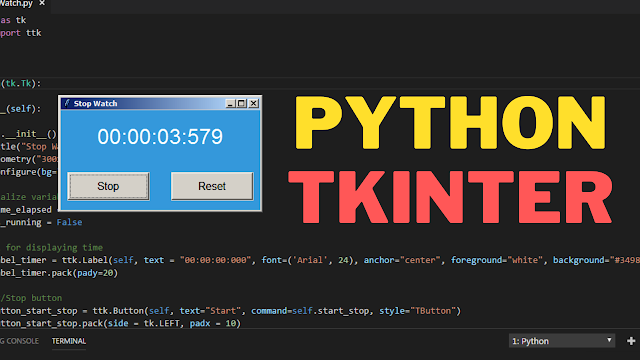How to Create a Modern Python Stopwatch with Tkinter GUI: A Step-by-Step Tutorial
In this Python tutorial we will create a simple stopwatch application using the Tkinter library for the graphical user interface.
The stopwatch has a timer display, a start/stop button, and a reset button.
Users can start, stop, and reset the timer, which displays the elapsed time in hours, minutes, seconds, and milliseconds.
What We Are Gonna Use In This Project:
- Python Programming Language.- Tkinter for GUI.
- VS Code Editor.
- VS Code Editor.
Project Source Code:
import tkinter as tk
from tkinter import ttk
import time
class StopWatch(tk.Tk):
def __init__(self):
super().__init__()
self.title("Stop Watch")
self.geometry("300x150")
self.configure(bg="#3498db")
# Initialize variables
self.time_elapsed = 0
self.is_running = False
# Label for displaying time
self.label_timer = ttk.Label(self, text = "00:00:00:000", font=('Arial', 24),
anchor="center", foreground="white", background="#3498db")
self.label_timer.pack(pady=20)
# Start/Stop button
self.button_start_stop = ttk.Button(self, text="Start",
command=self.start_stop, style="TButton")
self.button_start_stop.pack(side = tk.LEFT, padx = 10)
# Reset button
self.button_reset = ttk.Button(self, text="Reset",
command=self.reset, style="TButton")
self.button_reset.pack(side = tk.RIGHT, padx = 10)
# Configure button style
self.style = ttk.Style()
self.style.configure("TButton", padding=7, font=("Helvatica", 12))
# Initialize the stopwatch
self.update_time()
def start_stop(self):
# Toggle start/stop functionality
if self.is_running:
self.is_running = False
self.button_start_stop.config(text="Start")
else:
self.is_running = True
self.button_start_stop.config(text="Stop")
self.start_time = time.time() - self.time_elapsed
self.update_time()
def reset(self):
# Reset the stopwatch
self.is_running = False
self.time_elapsed = 0
self.label_timer.config(text="00:00:00:000")
self.button_start_stop.config(text="Start")
def update_time(self):
# Update the displayed time
if self.is_running:
elapsed_time = time.time() - self.start_time
self.time_elapsed = elapsed_time
else:
elapsed_time = self.time_elapsed
# Calculate hours, minutes, seconds, and milliseconds
hours = int(elapsed_time / 3600)
minutes = int((elapsed_time % 3600) / 60)
seconds = int(elapsed_time % 60)
milliseconds = int((elapsed_time % 1) * 1000)
# Format the time string
time_str = f"{hours:02d}:{minutes:02d}:{seconds:02d}:{milliseconds:03d}"
# Update the label text
self.label_timer.config(text=time_str)
# Schedule the update after 10 milliseconds
self.after(10, self.update_time)
if __name__ == "__main__":
app = StopWatch()
app.mainloop()

